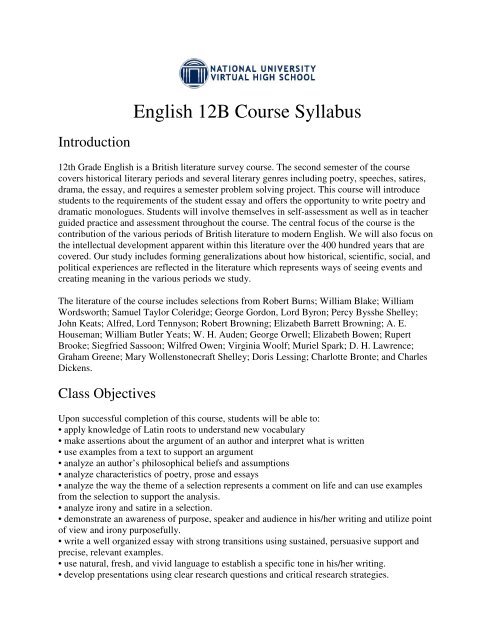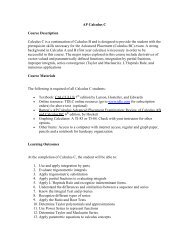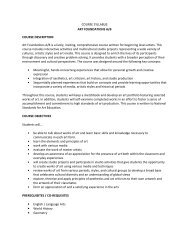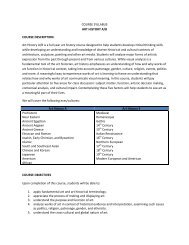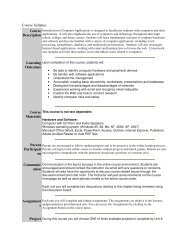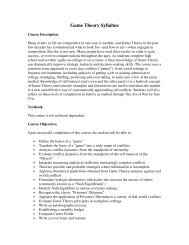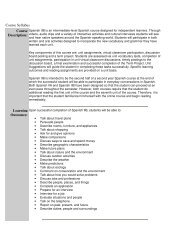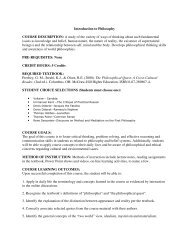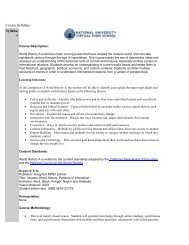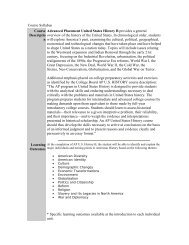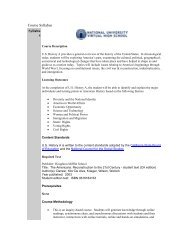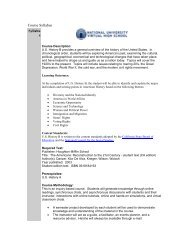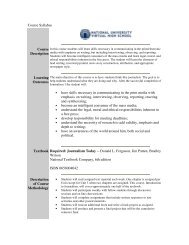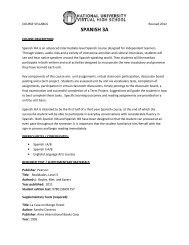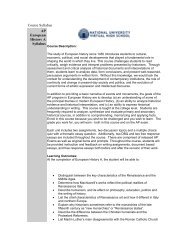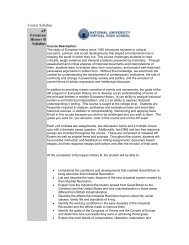English 12B Course Syllabus
English 12B Course Syllabus
English 12B Course Syllabus
You also want an ePaper? Increase the reach of your titles
YUMPU automatically turns print PDFs into web optimized ePapers that Google loves.
<strong>English</strong> <strong>12B</strong> <strong>Course</strong> <strong>Syllabus</strong><br />
Introduction<br />
12th Grade <strong>English</strong> is a British literature survey course. The second semester of the course<br />
covers historical literary periods and several literary genres including poetry, speeches, satires,<br />
drama, the essay, and requires a semester problem solving project. This course will introduce<br />
students to the requirements of the student essay and offers the opportunity to write poetry and<br />
dramatic monologues. Students will involve themselves in self-assessment as well as in teacher<br />
guided practice and assessment throughout the course. The central focus of the course is the<br />
contribution of the various periods of British literature to modern <strong>English</strong>. We will also focus on<br />
the intellectual development apparent within this literature over the 400 hundred years that are<br />
covered. Our study includes forming generalizations about how historical, scientific, social, and<br />
political experiences are reflected in the literature which represents ways of seeing events and<br />
creating meaning in the various periods we study.<br />
The literature of the course includes selections from Robert Burns; William Blake; William<br />
Wordsworth; Samuel Taylor Coleridge; George Gordon, Lord Byron; Percy Bysshe Shelley;<br />
John Keats; Alfred, Lord Tennyson; Robert Browning; Elizabeth Barrett Browning; A. E.<br />
Houseman; William Butler Yeats; W. H. Auden; George Orwell; Elizabeth Bowen; Rupert<br />
Brooke; Siegfried Sassoon; Wilfred Owen; Virginia Woolf; Muriel Spark; D. H. Lawrence;<br />
Graham Greene; Mary Wollenstonecraft Shelley; Doris Lessing; Charlotte Bronte; and Charles<br />
Dickens.<br />
Class Objectives<br />
Upon successful completion of this course, students will be able to:<br />
• apply knowledge of Latin roots to understand new vocabulary<br />
• make assertions about the argument of an author and interpret what is written<br />
• use examples from a text to support an argument<br />
• analyze an author’s philosophical beliefs and assumptions<br />
• analyze characteristics of poetry, prose and essays<br />
• analyze the way the theme of a selection represents a comment on life and can use examples<br />
from the selection to support the analysis.<br />
• analyze irony and satire in a selection.<br />
• demonstrate an awareness of purpose, speaker and audience in his/her writing and utilize point<br />
of view and irony purposefully.<br />
• write a well organized essay with strong transitions using sustained, persuasive support and<br />
precise, relevant examples.<br />
• use natural, fresh, and vivid language to establish a specific tone in his/her writing.<br />
• develop presentations using clear research questions and critical research strategies.
• revise text to highlight voice, sentence variety and enhance subtlety of meaning.<br />
• write fictional narratives, responses to literature, reflective compositions, and historical<br />
investigative reports.<br />
• deliver effective multimedia presentations.<br />
• demonstrate effective control of grammar, diction, paragraph and sentence structure.<br />
• deliver reflective presentations, oral reports on historical investigations, and responses to<br />
literature.<br />
Content Standards<br />
<strong>English</strong> 12A and B are written to the content standards adopted by the California State Board of<br />
Education and the National Council of Teachers of <strong>English</strong>.<br />
Required Texts<br />
Publisher: Pearson Prentice Hall<br />
Title: Literature Timeless Voices, Timeless Themes -- British Tradition<br />
Author(s): Kinsella, Carroll, Feldman, Stump, Wilson<br />
Year published: 2002<br />
Student edition text: ISBN 013054793X<br />
Prerequisites<br />
<strong>English</strong> 9, <strong>English</strong> 10, <strong>English</strong> 11, <strong>English</strong> 12A<br />
Description of Class Methodology<br />
• This is an inquiry-based course. Students will generate knowledge through online readings,<br />
synchronous chats, asynchronous discussions with students and their instructor, interactions with<br />
online tutorials, and online and hands-on simulations.<br />
• A semester project developed by each student will be used to demonstrate knowledge and<br />
understanding of the material in the course.<br />
• The instructor will act as a guide, a facilitator, an events planner, and a resource advisor.<br />
He/she will always be available through e-mail.<br />
• The student must actively construct and acquire knowledge by being intrinsically motivated to<br />
succeed. To succeed, students must participate and complete all readings and activities. This<br />
course requires the student’s active participation.<br />
Both formal and informal assessment methods will be used in the course. Informal assessment<br />
will include an evaluation of the quality and timeliness of participation in class activities. Formal<br />
assessment may include multiple-choice quizzes, tests, discussion board participation, and<br />
written assignments. A final exam will be given at the end of the course.<br />
<strong>Course</strong> Outline
Unit Topics Activities Readings<br />
1 Robert Burns and<br />
William Blake<br />
Dialect<br />
Symbols<br />
Allegory<br />
Vocabulary<br />
Comparison/contrast<br />
Essay questions<br />
Textbook questions<br />
To A Mouse<br />
To a Louse<br />
The Tyger<br />
Infant Sorrow<br />
Discussion questions Jane Eyre<br />
And the novelists<br />
Or<br />
Tale of Two Cities<br />
2 The Romantics<br />
and poetic devices:<br />
William<br />
Wordsworth<br />
Samuel Taylor<br />
Coleridge<br />
Alliteration<br />
Consonance<br />
Assonance<br />
Internal rhyme<br />
3 The Romantics<br />
and lyric poetry<br />
George Gordon,<br />
Lord Byron<br />
Percy Bysshe<br />
Shelley<br />
John Keats<br />
Poetic devices:<br />
Simile<br />
Vocabulary<br />
Persuasive writing or<br />
poetic writing<br />
Essay question on<br />
symbolism<br />
Textbook questions<br />
Discussion questions<br />
Create a chart of<br />
figurative language<br />
Response to poetry essay<br />
Essay questions<br />
Textbook questions<br />
Discussion questions<br />
Essay revision<br />
Or<br />
Animal Farm<br />
The World Is Too Much With Us<br />
I Wandered Lonely as a Cloud<br />
Rime of the Ancient Mariner<br />
Jane Eyre<br />
Or<br />
Tale of Two Cities<br />
Or<br />
Animal Farm<br />
She Walks in Beauty<br />
Child Harold's Pilgrimage<br />
Ozymandias<br />
To A Skylark<br />
When I Have Fears That I May Cease To<br />
Be<br />
Sonnet to a Cat
Metaphor<br />
Personification<br />
Jane Eyre<br />
Or<br />
Tale of Two Cities<br />
Or<br />
4 The Victorians:<br />
Dramatic<br />
monologue, the<br />
sonnet, and lyric<br />
poetry<br />
Tennyson<br />
Robert Browning<br />
Elizabeth Barrett<br />
Browning<br />
5 The poets of<br />
Transition: Moving<br />
from the 19th to<br />
the 20th Century:<br />
A.E. Houseman,<br />
William Butler<br />
Yeats, and W.H.<br />
Auden<br />
6 The literature of<br />
the early 20th<br />
century:<br />
Essay questions<br />
Textbook questions<br />
Discussion questions<br />
Discussions about<br />
Victorian poetry and<br />
modern music lyrics<br />
Graphic art and poetry<br />
Discussion of the<br />
extended metaphor<br />
Textbook questions<br />
Discussion questions<br />
Essay Revision<br />
Response to Literature<br />
essay<br />
Discussion of symbolism<br />
in poetry<br />
Textbook questions<br />
Animal Farm<br />
Flower in a Crannied Wall<br />
The Lady of Shalott<br />
My Last Duchess<br />
Elizabeth Browning's Sonnet 43<br />
Jane Eyre<br />
Or<br />
Tale of Two Cities<br />
Or<br />
Animal Farm<br />
To An Athlete Dying Young<br />
When I Was One and Twenty<br />
When You are Old<br />
The wild Swans at Coole<br />
In Memory of W. B. Yeats<br />
Musee des Beaux Arts<br />
Jane Eyre<br />
Or<br />
Tale of Two Cities<br />
Or<br />
Animal Farm<br />
Shooting an Elephant
Imperialism and<br />
World War 1<br />
7 The 20th Century<br />
Short Story:<br />
Woolf, Spark,<br />
Lawrence, and<br />
Greene<br />
Stream of<br />
consciousness<br />
Omniscient<br />
narrators<br />
8 British women<br />
comment on social<br />
issues:<br />
Mary<br />
Wollenstonecraft<br />
Shelley and Doris<br />
Lessing<br />
Discussion questions<br />
Essay on tone and irony<br />
Discussions about irony<br />
Textbook questions<br />
Discussion questions<br />
Discussions about point<br />
of view and tone<br />
Writing the position paper<br />
Revision of essay<br />
Discussion questions<br />
Presentation of Semester<br />
Problem Solving Project<br />
Student input into projects<br />
of all students<br />
Self Assessment<br />
The Demon Lover<br />
The Soldier<br />
Wirers<br />
Anthem for Doomed Youth<br />
Winston Churchill's Wartime Speech<br />
Jane Eyre<br />
Or<br />
Tale of Two Cities<br />
The Lady in the Looking Glass: A<br />
Reflection<br />
The First Year of My Life<br />
Rocking Horse Winner<br />
A Shocking Accident<br />
Introduction to Frankenstein<br />
No Witchcraft for Sale<br />
Student Projects<br />
Self Assessment document<br />
Assessment of<br />
interpretative skills<br />
learned during the<br />
semester<br />
Assessment of<br />
communication<br />
skills learned<br />
during the<br />
semester
Assessment<br />
Grading Scale<br />
Assignments<br />
Major Writing Assignments<br />
Discussion Board Prompts<br />
Assignments<br />
10 point each (6-8 per unit)<br />
50 points each (1 per unit)<br />
10 points each<br />
Midterm 50 points (Unit 4)<br />
Problem Solving Project 100 points (Unit 8)<br />
Final Exam - Reading 50 points (Unit 8)<br />
Final Exam - Writing 50 points (Unit 8)<br />
Final Exam - Literary Terms 50 points (Unit 8)<br />
Final Exam - Vocabulary 50 points (Unit 8)<br />
Grading Scale<br />
Letter Grade Percentage Earned<br />
A 90% - 100%<br />
B 80% - 89%<br />
C 70% - 79%<br />
D 60% - 69%<br />
F<br />
59% and lower<br />
Student’s Role and Responsibilities in this <strong>Course</strong><br />
Expectations:<br />
Students are expected to conduct themselves in a responsible manner that reflects sound ethics,<br />
honor, and good citizenship. It is the student’s responsibility to maintain academic honesty and<br />
integrity and to manifest their commitment to the goals of NUVHS through their conduct and<br />
behavior. Students are expected to abide by all NUVHS policies and regulations. Any form of<br />
academic dishonesty, or inappropriate conduct by students or applicants may result in penalties<br />
ranging from warning to dismissal, as deemed appropriate by NUVHS.<br />
Communication:<br />
Throughout this course students will need to be in close contact with their instructor and fellow<br />
students. Students are expected to communicate via email and electronic discussion boards.<br />
Therefore, students should plan on checking email at least three times a week and participate in<br />
the discussion boards during the weeks they are live.<br />
Instructors strongly encourage and welcome open communication. Clear, consistent, and<br />
proactive communication will ensure a successful experience in this course. It is the student’s<br />
responsibility to notify the instructor immediately if and when a personal situation occurs that
affects his/her performance in this class. Being proactive with communication will result in a<br />
quick solution to any problems that may occur.<br />
Technical Support is offered through Spectrum Pacific Learning Company (SPLC). Should a<br />
student need any technical assistance, he/she should email the Help Desk as soon as possible at<br />
helpdesk@myonlinelogin.com or call 1-877-252-7715. SPLC will help resolve technical<br />
problems and walk through the solution with students. If a problem persists for more than 48<br />
hours, the student must also notify his/her teachers and NUVHS.<br />
Time Required For This <strong>Course</strong>:<br />
To finish this course in eight weeks, students should plan to allocate at least 12-15 hours per unit<br />
on assigned readings, assignments, discussions (asynchronous and synchronous), and exams. It is<br />
highly recommended that students organize themselves around the course schedule.<br />
NUVHS Expected Schoolwide Learning Results (ESLRs):<br />
It is anticipated that NUVHS students will be:<br />
Engaged Learners<br />
1. Demonstrate self-directed learning skills such as time management, and personal<br />
responsibility through the completion of course requirements.<br />
2. Develop an understanding of their own preferred learning styles to enhance their overall<br />
academic potential.<br />
3. Incorporate effective and relevant internet and multimedia resources in their learning process<br />
to broaden their knowledge base.<br />
Critical Thinkers<br />
1. Effectively analyze and articulate sound opinions on a variety of complex concepts.<br />
2. Illustrate a variety of problem-solving strategies that strengthen college preparation and<br />
workforce readiness.<br />
3. Formulate a framework for applying a variety of technology and internet-based research to<br />
enhance information literacy and collaborative thinking.<br />
Effective Communicators<br />
1. Demonstrate awareness and sensitivity to tone and voice in multiple forms of communication.<br />
2. Express concepts and ideas in a variety of forms.<br />
3. Enhance communication skills through the use of media rich or other technology resources.<br />
Global Citizens
1. Appreciate the value of diversity.<br />
2. Understand the range of local and international issues facing today's global community.<br />
3. Demonstrate awareness of the importance of cultural sensitivity and social responsibility in the<br />
21st century.


